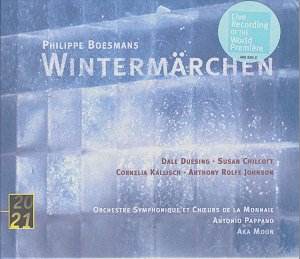Philippe BOESMANS (b.
1936)
Wintermärchen
Libretto after William Shakespeare by Luc Bondy and Marie-Louise
Bischofberger
Leontes-Dale Duesing, Baritone
Hermione-Susan Chilcott, Soprano
Paulina-Cornelia Kallisch, Mezzo-soprano
Polixenes-Anthony Rolfe Johnson, Tenor
Camillo-Franz-Josef Selig, Bass
Green-Heinz Zednik, Tenor
Antigonus- Juha Kotilainen, Baritone
Florizel-Kris Dane
Mamillius-Arthur Debski
Perdita-Johanne Saunier, Silent role
 Orchestre Symphonique
et Chœurs de la Monnaie/Antonio Pappano
Orchestre Symphonique
et Chœurs de la Monnaie/Antonio Pappano
AKA Moon
rec live, Théâtre Royal de la Monnaie, Brussels, 10 December
1999
 DEUTSCHE GRAMMOPHON 20/21 469 559-2 DDD [2CDs:CD1 65:57; CD2
53:27]
DEUTSCHE GRAMMOPHON 20/21 469 559-2 DDD [2CDs:CD1 65:57; CD2
53:27]
Crotchet
AmazonUK
AmazonUS
Amazon
recommendations

Belgian born in 1936, the name of Philippe Boesmans will be new to many British
listeners although his previous stage work, Reigen, met with considerable
acclaim following its Brussels premiere in 1993, subsequently being staged
in France, Germany and Austria. Credit is therefore due to Deutsche Grammophon
for showing the enterprise (not without risk) of putting Boesmans' latest
opera before a wider public, enterprise which it is to be hoped pays off
for the work offers much to discover.
This live recording of the world premiere took place at the Théâtre
Royal de la Monnaie, Brussels on the 10th December 1999. Antonio
Pappano has a fine cast under his direction and with a few relatively minor
reservations they perform with impressive success. My initial doubts were
concentrated around the libretto. Shakespeare's dark tale of insane jealousy
and ultimate reconciliation presents a major challenge to the librettists
although Luc Bondy and Marie-Louise Bischofberger cleverly overcome this,
largely through the part of Green (alias time) whose interventional commentary
serves as the structurally binding thread running through the entire work
(as does the theme heard in the opening bars on the accordion which Green
plays as he stands outside the palace of Leontes in Sicily).
Act One deals with the onset of Leontes' pathological jealousy, the result
of his childhood friend Polixenes, the King of Bohemia, accepting the request
of Leontes' wife Hermione to stay on at the royal palace in Sicily following
his initial refusal to Leontes himself. There is some fine atmosphere building
here (track two) as the first doubts of his wife's fidelity enter Leontes'
mind. As Leontes' jealousy transforms into insanity the tension is skilfully
intensified by Boesmans with a duet between Leontes and his servant Camillo
as Leontes issues the order for Polixenes to be murdered. Act two sees the
birth of Hermione's daughter whom Leontes banishes to foreign shores. The
subsequent trial of Hermione for treason, conspiracy and adultery is one
of the undoubted highlights of the opera, as in the face of the death of
his wife and son, Leontes realises the horror of what he has done. Dale Duesing
is superb in the concluding bars of the act as Leontes mourns his loss.
Act three is marked by two significant changes in compositional tack. In
scene four (track three) the language changes from German to English and
Boesmans introduces AKA Moon, a jazz/funk combo whose brand of improvisatory
fusion sounds strangely ill at ease and ultimately rather dated. This change
to a kind of vernacular colloquialism is admirable in principle, designed
as it is, to reflect the change of location to the "Bohemian coast" and the
underworld existence of Florizel, the long lost son of Polixenes who has
resorted to a life of pick-pocketing and petty crime. In reality I found
it to unsettle the whole balance of the act. Fortunately however, it does
not last for long and I was glad when Boesmans returned to his accustomed
musical language in track six. The culmination of the work in Act four is
well handled as Hermione is revealed imprisoned in a block of ice and emerges,
the ice thawing and shattering around her, to the remorse of Leontes and
his uneasiness that his insanity may return.
Boesmans' language is by turns kaleidoscopically colourful and lyrical. His
orchestration is finely detailed, the sometimes eclectic melodic and harmonic
characteristics of his music accessible yet challenging. Many listeners will
recognise the many fleeting references to Richard Strauss, Mozart and Berg
which he readily uses (often not a direct quote but an unmistakable shadow).
Certainly he has distanced himself from the avant-garde and there is little
in this work which anyone with doubts as to the extent of their musical
adventurousness need fear. Anyone who has enjoyed the operas of Britten for
instance, is likely to feel at home with Boesmans' sound world.
Given the limitations of the pit acoustic the sound is impressively vivid
and Antonio Pappano conducts with the tautness that we have come to expect
from him. The cast is on exceptional form and sing to the highest standard
throughout although Dale Duesing, Susan Chilcott and Heinz Zednik are worthy
of particular mention.
As with all of Deutsche Grammophon's releases in their 20/21 series the packaging
is beautifully put together and the booklet is highly comprehensive,
complementing the libretto and synopsis with an interesting interview with
the composer and an introductory essay by Alain Perroux. It completes a fine
release that will give many opera lovers a good deal of pleasure.
Christopher Thomas

